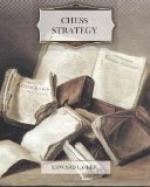--------------------------------------- 8 | | | | | #R | | #K | | |---------------------------------------| 7 | | | #P | | #R | | #P | #P | |---------------------------------------| 6 | | #P | |#Kt | | #P | | | |---------------------------------------| 5 | | | | | | | | | |---------------------------------------| 4 | | | | | ^P | | | | |---------------------------------------| 3 | | | ^P | | | |^Kt | | |---------------------------------------| 2 | ^P | ^P | ^B | | | | ^P | ^P | |---------------------------------------| 1 | | | | ^R | | ^K | | | --------------------------------------- A B C D E F G H
Diag. 5.
Chess would be an easy game if all combinations could be tested and probed exhaustively by the mathematical process just shown. But we shall find that the complications met with are extremely varied. To give the beginner an idea of this, I will mention a few of the more frequent examples. It will be seen that the calculation may be, and very frequently
--------------------------------------- 8 | | | #R | | | #R | #K | | |---------------------------------------| 7 | #P | | | | | #P | #P | #P | |---------------------------------------| 6 | | #P | #B | ^R | |#Kt | | | |---------------------------------------| 5 | | | #P | | | | | | |---------------------------------------| 4 | | | | | ^P | | | | |---------------------------------------| 3 | | ^B | ^P | | |^Kt | | | |---------------------------------------| 2 | | ^P | | | | ^P | ^P | ^P | |---------------------------------------| 1 | | | | | ^R | | ^K | | --------------------------------------- A B C D E F G H
Diag. 6.
is, upset by one of the pieces involved being exchanged or sacrificed. An example of this is found in Diagram 6; KtxP
--------------------------------------- 8 | | | | | | | | | |---------------------------------------| 7 | | | | | | | #P | #K | |---------------------------------------| 6 | #B | #P | | | | | | #P | |---------------------------------------| 5 | | | #P | ^P |#Kt | | | | |---------------------------------------| 4 | | | ^P | | | | | | |---------------------------------------| 3 | | | | |^Kt | | ^B | | |---------------------------------------| 2 | ^P | | | | | | | ^P | |---------------------------------------| 1 | ^K | | | | | | | | --------------------------------------- A B C D E F G H
Diag. 7.
fails on account of R X B; this leaves the Knight unprotected, and White wins two pieces for his Rook. Neither can the Bishop capture on K5 because of R X Kt. leaving the Bishop unprotected, after which BxKt does not retrieve the situation because the Rook recaptures from B6.




